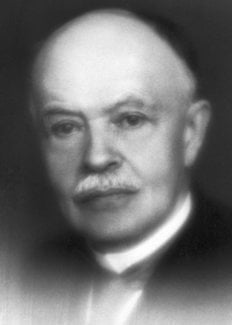Charles Nicolle
Biographical

Charles Jules Henry Nicolle was born in Rouen on September 21, 1866, where his father, Eugène Nicolle, was a doctor in a local hospital. Charles received, together with his brothers, early tuition in biology from his father and, after education at the Lycée Corneille de Rouen, he entered the local medical school where he studied for three years before following his elder brother, Maurice, who was working in Paris hospitals. (Maurice later became Director of the Bacteriological Institute of Constantinople and a Professor at the Pasteur Institute, Paris.) Meanwhile, Charles had studied under A. Gombault in the Faculty of Medicine and under Roux at the Pasteur Institute (serving at the same time as demonstrator in the microbiology course) to complete a thesis “Recherches sur la chancre mou” (Researches on the soft chancre), which gained him his M.D. degree in 1893. He returned to Rouen to become a member of the Medical Faculty and in 1896 he was appointed Director of the Bacteriological Laboratory. He continued in this capacity until 1903 when he was appointed Director of the Pasteur Institute in Tunis, a position he held until his death in 1936.
Early in his career, Nicolle worked on cancer, and at Rouen he investigated the preparation of diphtheria antiserum. In North Africa, under his influence, the Institute at Tunis quickly became a world-famous centre for bacteriological research and for the production of vaccines and serums to combat most of the prevalent infectious diseases. His discovery in 1909 that typhus fever is transmitted by the body louse helped to make a clear distinction between the classical louse-bound epidemic typhus and murine typhus, which is conveyed to man by the rat flea. He also made invaluable contributions to present-day knowledge of Malta fever, where he introduced preventive vaccination; tick fever, where he discovered the means of transmission; scarlet fever, by experimental reproduction with streptococci; rinderpest, measles, influenza, by his work on the nature of the virus; tuberculosis and trachoma. He was responsible for the introduction of many new techniques and innovations in bacteriology. Nicolle was one of the first to recognize the protective properties of the convalescence serum against typhus and measles; and succeeded in cultivating Leishmania donovani and Leishmania tropica on artificial culture media. His discovery of the mechanism of the transmission of typhus fever has created the basis for the preventive precautions against this disease, during the 1914-1918 and 1939-1945 Wars.
Nicolle wrote several important books including Le Destin des Maladies infectieuses; La Nature, conception et morale biologiques; Responsabilités de la Médecine, and La Destinée humaine.
Nicolle was an Associate of l’Academie de Médecine and he was awarded the Prix Montyon in 1909, 1912, and 1914; the Prix Osiris in 1927, and a special Gold Medal to commemorate his Silver Jubilee in Tunis in 1928. On this occasion he was also appointed member of the Académie des Sciences, Paris. In 1932, he was elected Professor in the College of France.
Charles Nicolle also enjoyed considerable reputation as a philosopher and as a writer of fanciful stories, such as Le Pâtissier de Bellone, Les deux Larrons, and Les Contes de Marmouse. He was said by Jean Rostand to be “a poet and realist, a man of dreams and a man of truth”.
Nicolle married Alice Avice in 1895; two children came from this marriage, Marcelle (b. 1896) and Pierre (b. 1898).
He died on February 28, 1936.
This autobiography/biography was written at the time of the award and first published in the book series Les Prix Nobel. It was later edited and republished in Nobel Lectures. To cite this document, always state the source as shown above.
The Nobel Foundation's copyright has expired.Nobel Prizes and laureates
Six prizes were awarded for achievements that have conferred the greatest benefit to humankind. The 14 laureates' work and discoveries range from quantum tunnelling to promoting democratic rights.
See them all presented here.
